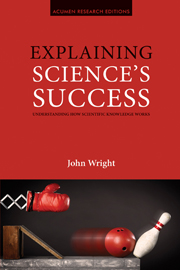Book contents
- Frontmatter
- Contents
- 1 Some surprising phenomena
- 2 Some unsatisfactory explanations of the phenomena
- 3 A defeasible a priori justification of induction
- 4 The independence of theory from data
- 5 Some more success-conducive properties of theories
- 6 Newton's laws of motion and law of gravitation
- 7 Special relativity
- 8 Mendelian genetics
- 9 Conclusion
- Notes
- Bibliography
- Index
7 - Special relativity
- Frontmatter
- Contents
- 1 Some surprising phenomena
- 2 Some unsatisfactory explanations of the phenomena
- 3 A defeasible a priori justification of induction
- 4 The independence of theory from data
- 5 Some more success-conducive properties of theories
- 6 Newton's laws of motion and law of gravitation
- 7 Special relativity
- 8 Mendelian genetics
- 9 Conclusion
- Notes
- Bibliography
- Index
Summary
INTRODUCTORY REMARKS
In this chapter we will consider Einstein's arguments for special relativity. It will be argued that the various inferential steps taken by Einstein in developing the theory can be explained within the framework developed here.
It is highly desirable for the view offered here to be able to account for special relativity. The theory has led to some very surprising predictions, which have received subsequent confirmation. One of these surprising predictions is the phenomenon of “time-dilation”, or the slowing of time in an object moving very quickly with respect to the observer. It has, for example, been experimentally observed that certain particles accelerated close to the speed of light have their normally very brief life-spans greatly extended, consistent with the time-dilation predicted by the special theory. Another novel prediction of the theory, the “twin paradox”, was confirmed when it was found that when two very accurate clocks were moved in different ways and then reunited, there was a noticeable difference between the time registered by them (Hafele & Keating 1972: 166–70). Again, the difference was consistent with that predicted by relativity. Or again, the special theory of relativity leads to the famous equation E = mc2, which in turn has a role to play in predicting atomic explosions, nuclear fusion, the energy released in atomic reactors and the loss of mass accompanying such phenomena.
It can hardly be denied that these examples of novel predictive success are very impressive. From the point of view of common sense, the claim that time will run more slowly the faster that an object moves, or that a moved object will age more slowly than one that remains stationary, are perhaps some of the most counter-intuitive predictions ever made. And they were certainly novel predictions: Einstein had not observed time-dilation, clock retardation produced by motion or mass loss due to the release of energy when he first formulated the theory in 1905. So it is desirable that the account offered here be able to explain these examples of novel predictive success.
- Type
- Chapter
- Information
- Explaining Science's SuccessUnderstanding How Scientific Knowledge Works, pp. 139 - 161Publisher: Acumen PublishingPrint publication year: 2012



